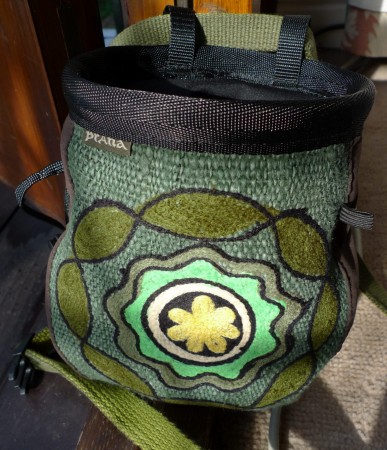July 29th, 2012
I had some surprisingly well-timed holiday booked this week so I decided to visit a nearby(ish) castle at Rochester. The last time I came here I was a small child and all I remember is being terrified by how tall and massive it was. Some shrinkage has occurred over the last twenty years. Still it’s a very pleasant castle and nicely preserved too. Worth visiting, although there’s not a whole lot else to do in Rochester.
Some photos I took (not my best):
Come back for more castle next week!
July 21st, 2012
Mutants!

July 15th, 2012
Got this really cute hemp chalk bag. Climbing is all about the fashion.

July 8th, 2012
It’s kind of annoying to have to go back and run GDB after your program crashes. Here’s a signal handler I’ve been using which drops you into GDB straight away:
static void gdb_sighandler(int sig, siginfo_t *info)
{
char exe[256];
if (readlink("/proc/self/exe", exe, sizeof(exe)) < 0) {
perror("readlink");
exit(EXIT_FAILURE);
}
char pid[16];
snprintf(pid, sizeof(pid), "%d", getpid());
pid_t p = fork();
if (p == 0) {
execl("/usr/bin/gdb", "gdb", "-ex", "cont",
exe, pid, NULL);
perror("execl");
exit(EXIT_FAILURE);
}
else if (p < 0) {
perror("fork");
exit(EXIT_FAILURE);
}
else {
// Allow a little time for GDB to start before
// dropping into the default signal handler
sleep(1);
signal(sig, SIG_DFL);
}
}This probably breaks all sorts of rules on what you shouldn’t do in a signal handler but hey, it was going to crash anyway. Resetting the handler to SIG_DFL at the end is important or you’ll end up stuck in a loop when you try to quit GDB. Install it for all the unpleasant signals like this:
struct sigaction sa;
sa.sa_sigaction = (void*)gdb_sighandler;
sigemptyset(&sa.sa_mask);
sa.sa_flags = SA_RESTART | SA_SIGINFO;
sigaction(SIGSEGV, &sa, NULL);
sigaction(SIGUSR1, &sa, NULL);
sigaction(SIGFPE, &sa, NULL);
sigaction(SIGBUS, &sa, NULL);
sigaction(SIGILL, &sa, NULL);
sigaction(SIGABRT, &sa, NULL);
It’s probably worth checking whether GDB is already running before you do this. On Linux you can check this by trying to ptrace yourself: if it succeeds then a debugger isn’t attached.
static int is_debugger_running(void)
{
pid_t pid = fork();
if (pid == -1) {
perror("fork");
exit(EXIT_FAILURE);
}
else if (pid == 0) {
int ppid = getppid();
if (ptrace(PTRACE_ATTACH, ppid, NULL, NULL) == 0) {
waitpid(ppid, NULL, 0);
ptrace(PTRACE_CONT, NULL, NULL);
ptrace(PTRACE_DETACH, getppid(), NULL, NULL);
exit(0);
}
else
exit(1);
}
else {
int status;
waitpid(pid, &status, 0);
return WEXITSTATUS(status);
}
}
July 7th, 2012
Title says it all: some red flowers in a field last weekend:

I don’t know what sort they are :-(. Also a big stone in a place appropriately called Ibstone:

Wikipedia thinks the stone is marking the Bucks/Oxfordshire border, which is a bit mundane.
Also I’ve decided that driving is among the most stressful and miserable experiences known to mankind. I have no idea how people can do this all day and actually enjoy it…
UPDATE: a reader informs me that the flowers are poppies.























 Posts
Posts